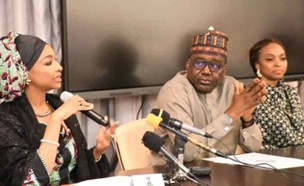 … as fossil fuels lose ground to clean energy
… as fossil fuels lose ground to clean energy
07 August 2017, Sweetcrude, Port Harcourt — It was at Aburi, Ghana that Jack Gowon removed his gloves, stating without pretence that the Nigerian Civil War was about the control of the Oil deposits in Eastern Nigeria. No one expressed any surprise; the world had known that it had nothing to do with keeping Nigeria one or of liberating the minority ethnic nationalities of the Eastern Region from the majority Igbo stock. The Aburi Conference was held between the 4th and 5th of January, 1967. On the 27th of May 1967, the Federal Government of Nigeria created several states including Rivers, the East Central and Lagos, in a move that was seen by political watchers at the time as a move to appease and bribe the ethnic minorities. At the time of the creation of the new states, Nigerian policy of revenue from oil and gas was basically the collection of taxes and royalties. According to Wikipedia:
“Despite oil’s prominent role in national affairs, up to this time,
the Nigerian federal government had only limited involvement
In the oil industry, and the government confined its financial
Involvement in the oil industry to taxes and royalties on the oil
Companies…Gowon’s military government instituted 1969
Decree which dismantled the existing revenue allocation formula
that had divided revenue from oil taxes equally between federal
and state government, instead favouring an allocation formula
in which the federal government controlled the dispensation of
revenue to the states.” Underlining mine for emphasis.
Note that before the Civil War and the promulgation of the Petroleum Decree which the Federal Government claimed was for the prosecution of the Nigerian Civil War, Nigeria had vibrant local and export markets in hides and skins, palm oil, cocoa, coal groundnut which produced the tax that the federal and states governments were administered with. With the enactment by military fiat of the Petroleum Decree, Nigeria did not only come into the control of the dispensation of revenue to ALL the states of the federation, it also maintained its regulatory powers over the Oil and Gas Industry and famously added ownership of the resource, operator, licensor, allocator, inspector, concessionaire, among other unbelievable roles in a bid to control the petrodollars accruing to the industry like the family controlled city-states of the Arabian peninsula. Of course, the Civil war ended, a year after the enactment of the Petroleum Decree but the policy was deepened in its application instead of being reversed following the extinction of the reason that was advertised for its enactment.
And that is how Nigeria became a single-resource economy, local and foreign investors in other sectors of the economy withdrawing their investments and throwing same after the “smart money” that was the revenue from Oil and Gas. Despite about four decades of protest from oil producing states, ethnic nationalities hosting oil and gas wells and their operations, militant groups, the Nigerian intelligentsia, foreign sympathisers and environmentalists, the Nigerian government hung on to this anachronistic and regressive policy until it was presented with a fait accompli with the entry into the global energy industry of renewable clean energy. Clean energy, the rave of the moment is derived from many sources including wind, the sun, water currents and sugar cane. As its name implies, it is clean and does not, in its usage, produce noxious by-products which threaten life on Earth in the manner that fossil fuels have done. From Japan to Norway and from the United State of America to Germany, the race is on to replace cars and vehicles powered by fossil fuels with cars powered by clean energy.
Despite facing a secessionist threat from the Southern states of Nigeria on account largely of an unpopular policy that gives the federal government control over the resources required by the states to develop their economies and infrastructure and despite facing rapidly dwindling fortunes owing to the lull in the demand for the country’s major income earner, over burgeoning recurrent expenses owing to its insistence on magnifying its control over aspects of the economy the states lay claim to, Nigeria’s federal government wallows in denial, describing activists for the change in the structure of the country as job seekers. This country can yet be saved the humiliating social catastrophes that may be brought on by the complete bankruptcy that is certain to come as the major economies that buy our oil and gas wean themselves completely off fossil fuels, if the authorities take proactive steps to diversify the economic base of the country, ceding necessary controls to the states for effective administration and the pursuance and achievement of states’ developmental priorities.



